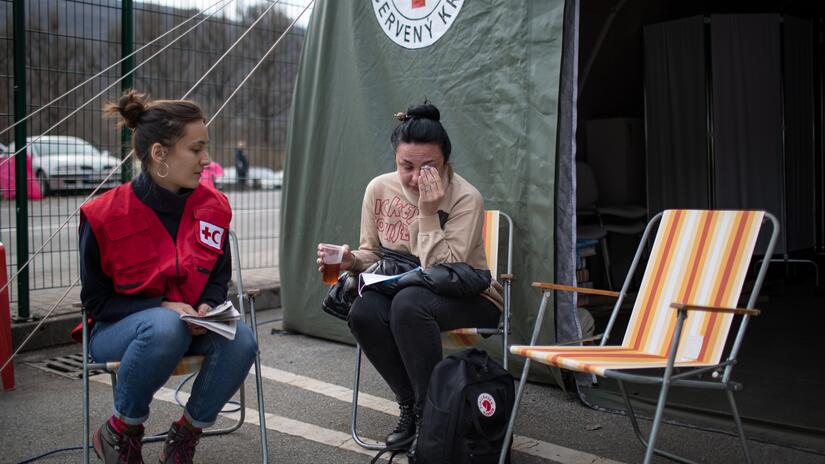Geneva/Brussels - 10 April 2024
More than two years of armed conflict - with no end in sight - is leading to a sense of ‘futurelessness’ for displaced people from Ukraine, experts said at a conference in Brussels. Despite the incredible resilience people have been showing, this experience is likely to have a long-term impact on their mental health if not addressed in time.
The conference was organised by the International Federation of Red Cross and Red Crescent Societies as part of a European Union-funded EU4Health project, which aims to provide mental health and psychosocial support services for people affected by the ongoing conflict. Speakers included Stella Kyriakides, European Commissioner for Health and Food Safety, and Xavier Castellanos Mosquera, Under Secretary General for the IFRC.
Participants discussed the mental health needs of those forced to leave their homes, based on a recent survey conducted by the IFRC. Findings include:
- 83% of people affected by the conflict said they or family members had faced stressful or traumatic events. Two-thirds said displacement had had a negative impact on them. Of those surveyed, 79% were outside Ukraine, 21% inside.
- 30% of displaced Ukrainians had sought some form of psychological support since the escalation of the conflict in 2022, which reveals a demand for mental health services.
Ganna Goloktionova, Technical Advisor in the IFRC’s Psychosocial Centre, said that uncertainty about the future was the top source of stress for Ukrainians. She emphasised that the combined toll of ongoing armed conflict, insecurity through displacement, the destruction of family structures, the temporary nature of protection, and financial stresses all negatively contribute to displaced Ukrainians’ mental health.
“Many Ukrainians can’t see a future.” she said. “This state of ‘futurelessness’ is having a devastating impact on the mental health of Ukrainians, both those in Ukraine and refugees in countries elsewhere.”
Xavier Castellanos Mosquera, IFRC Under Secretary General said:
“Intervention at the right time can help and, in the long term, give people their futures back. Psychosocial support programmes are some of the least expensive activities in humanitarian responses. But they can have a priceless impact.”
Birgitte Bischoff Ebbesen, IFRC Regional Director for Europe said:
“We know how vital mental health interventions can be, particularly when provided early. Red Cross and Red Crescent volunteers from Ukraine and host communities build the necessary trust that helps us in addressing the stigma that still, sadly, surrounds mental health.”
Across Europe, 37 Red Cross and Red Crescent National Societies are providing mental health and psychosocial support services and have reached 1.2 million people.
Background
There is an EU-funded collaboration between the IFRC, the European Commission’s Directorate General for Health and Food Safety, and National Red Cross Societies in Ukraine and 24 European countries to provide psychosocial support to people from Ukraine since May 2022. This programme has supported more than 200,000 affected people and has seen 11,000 health professionals and volunteers trained in mental health and psychosocial support.
Listen to IFRC’s People in the Red Vest podcast episode: Nataliia Korniienko: Helping her fellow refugees cope with the stresses of conflict, migration and starting over | IFRC
For further details or interview requests contact
Geneva – Andrew Thomas +41 763676587
Brussels – Zsofia Varga +36 70 508 5718





